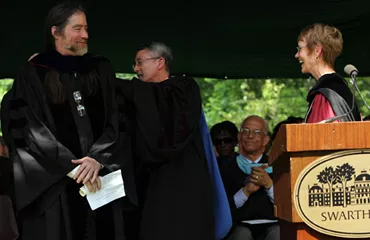President Chopp's Introduction of David Kennedy '80

David Kennedy, you are a renowned teacher, an influential scholar, and a tireless activist in the area of criminal justice and public policy. You have advocated for a justice system based on policing and prevention that enables young offenders to rethink their choices and reform their lives. Your imaginative ideas have been implemented in major cities around the world, reducing crime rates among young people and saving lives. You have helped to build organizations and establish programs that enable communities to protect neighborhoods and renew their sense of common purpose.
The child of Swarthmore alumni Christopher Kennedy '54 and Jane Walker '55, you graduated from the College in 1980 with high honors in philosophy and history. For many years, you worked first as a casewriter and then as a lecturer and senior researcher in the Program in Criminal Justice Policy and Management in the John F. Kennedy School of Government at Harvard. There, you honed your ideas about neighborhood revitalization, youth violence, and deterrence theory. You wrote editorials for national publications like The New York Times, The Washington Post, and The Boston Globe, and advised a variety of government offices and agencies, including the Justice Department, the Office of National Drug Control Policy, and the White House. In the 1990s you directed the Boston Gun Project, a groundbreaking initiative aimed at reducing youth violence, and implemented Operation Ceasefire, which resulted in a 60 percent reduction in homicides among people under age 24 in that city. You continued to advise numerous corrections programs in over 20 cities in America and abroad and served as a special advisor on youth violence to President Clinton, Hillary Clinton, John Kerry, and the Department of Justice. In 2005, you became the director of the Center for Crime Prevention and Control and Professor of Anthropology at the John Jay College of Criminal Justice.
You have published numerous case studies in policing and public policy, editorials and op-ed essays in the national media, and a variety of articles and books such as "Pulling Levers: Getting Deterrence Right," A New Era for Policing, and Reducing Gun Violence, which was called "a penetrating analysis of the limitations of traditional police strategies." Your book, Deterrence and Crime Prevention: Reconsidering the Prospect of Sanction, has been called "a landmark rethinking of public policy" and "a primer on 21st-century policing."
Among your many awards in the areas of public policy and criminal justice are the Ford Foundation Innovations in Government Award, the Herman Goldstein International Award for Problem Oriented Policing, and the Person of the Year Award from Law Enforcement News. In 2009, your groundbreaking work in Boston, Cincinnati, and other cities was detailed and commended in a long article in The New Yorker titled "Don't Shoot: A Radical Approach to the Problem of Gang Violence." Your work has also been featured in Newsweek, where you were called "the only person who has ever come up with a consistently viable (and cost-effective) strategy for helping the inner city."
David Kennedy, you are one of the most creative scholar-practitioners in the area of criminal justice. Your work with police and young people on the streets, with families and juvenile offenders, with courts and communities has helped to transform the way we understand crime and reform young criminals by offering them meaningful choices. You serve as a role model for our students who seek to have an impact in the world through the rigorous use of their intellects, their commitment to public service, and their belief in the possibilities for positive social change.
Upon the recommendation of the faculty and by the power vested in me by the Board of Managers of Swarthmore College and the Commonwealth of Pennsylvania, I have the honor to bestow upon you the degree of Doctor of Laws.



